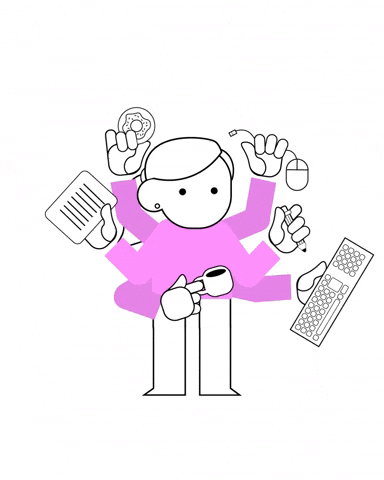- Kwik Brain Newsletter
- Posts
- How Stress Can Propel You to Success
How Stress Can Propel You to Success
Discover the Fine Line Between Eustress and Distress

Read Time: 3.5 minutes

What if I told you that stress, often seen as a villain, can actually be your secret weapon to success? In this newslettter, we'll dive into the world of eustress and distress, and how you can master the art of stress management to become the superhero of your own life!

Myths about Stress
Before we embark on this transformative journey, let's debunk some common myths about stress:
Myth: All stress is bad for you.
The truth: Eustress, or "good stress," can actually boost cognitive function and motivate you to perform at your best.
Myth: Stress is unavoidable, so there's nothing you can do about it.
Truth: While stress is a part of life, you have the power to manage it effectively through various techniques and lifestyle changes.

Not All Stress Is Bad

Eustress: The Brain's Motivator Imagine eustress as your brain’s personal trainer, pushing you just enough to strengthen your mental muscles. It's the positive stress that propels you forward before a key presentation, energizes you at the start of a new challenge, or heightens your excitement on an adventurous escapade. This beneficial stress is shown to sharpen focus, enhance memory, and fortify emotional resilience, truly optimizing brain function for peak moments.
Distress: The Brain's Adversary Conversely, distress is the stress that weighs you down. When persistent, it can erode mental health, trigger anxiety, impair memory, and even weaken physical health. It's the unrelenting worry over finances, the oppressive strain of deadlines, or the chronic anxiety about personal relationships. Chronic exposure to distress can physically alter brain structures, heighten inflammation, and accelerate cognitive decline, emphasizing the necessity for effective stress management.
Balancing Brain Health Through Stress Management Achieving a balance between eustress and distress can significantly boost our brain health and cognitive capabilities. While eustress can improve memory and learning, distress, left unchecked, can lead to mental and physical health declines. The art of balance lies in recognizing and cultivating eustress while diminishing the impact of distress through proactive strategies.

Finding the Balance

So, how do we find the balance between eustress and distress? The key is to manage stress effectively. This can include techniques like mindfulness meditation, regular physical exercise, and maintaining a healthy diet. It's also important to have a support system of friends and family and to take time for self-care and relaxation.
Identifying Good vs Bad Stress
To determine if you are experiencing eustress or distress, pay attention to your physical and emotional responses. Eustress often feels exciting and motivating, while distress feels overwhelming and draining. Here are some signs to watch for:
Eustress:
Feeling energized and focused
Improved performance and productivity
Feeling challenged but in control
Temporary physical symptoms like increased heart rate or sweating
Distress:
Constant worry or anxiety
Difficulty concentrating or making decisions
Feeling overwhelmed or out of control
Persistent physical symptoms like headaches, muscle tension, or insomnia
Managing Stress
Meditation
Practice Regularly: Aim for a daily meditation session, even if it's only for a few minutes. Consistency is key. Start Simple: Begin with guided meditations available through apps like Headspace or Calm, which are great for beginners. Set a Routine: Try meditating at the same time each day to establish it as a habit, such as in the morning to start your day focused, or in the evening to unwind.Exercise
Incorporate Variety: Mix cardiovascular exercises, strength training, and flexibility workouts to keep your routine engaging and balanced. Daily Movement: Aim for at least 30 minutes of moderate activity most days of the week. Even a brisk walk counts. Use Exercise as a Break: Short bursts of activity, like a 10-minute walk after every hour of sedentary work, can help reset your brain and reduce stress.Diet
Focus on Brain Foods: Incorporate foods rich in omega-3 fatty acids, antioxidants, and vitamins. Think fatty fish, nuts, berries, and leafy greens. Hydration: Drink plenty of water throughout the day to help maintain optimal brain function and overall health. Limit Processed Foods: Reduce intake of processed foods and sugars, which can exacerbate stress and impact mood stability.Sleep
Create a Sleep Schedule: Go to bed and wake up at the same time every day to regulate your body's clock. Optimize Your Sleep Environment: Ensure your bedroom is conducive to sleep—cool, dark, and quiet. Wind Down Routine: Establish a pre-sleep routine that might include reading, stretching, or listening to calming music to signal to your body that it's time to wind down.Relationships
Cultivate Supportive Relationships: Spend time with friends and family who uplift you. Strong social support can act as a buffer against stress. Communicate Effectively: Be open about your needs and feelings, and listen actively to others. Engage in Community Activities: Join clubs, groups, or online communities that align with your interests to foster meaningful connections.

Bonus Tips
Breathing Techniques: Practice deep breathing exercises daily, such as the 4-7-8 technique, to reduce anxiety and calm the mind.
Sunlight Exposure: Aim for at least 15-30 minutes of sunlight exposure daily to boost vitamin D levels, which can improve mood and overall mental health.
Cold and Hot Therapy: Experiment with alternating between cold and hot showers to stimulate blood flow and reduce muscle inflammation. Consider visiting a sauna, or take cold plunges to enhance stress resilience and boost endorphins.
More Resources
How was today's newsletter? |